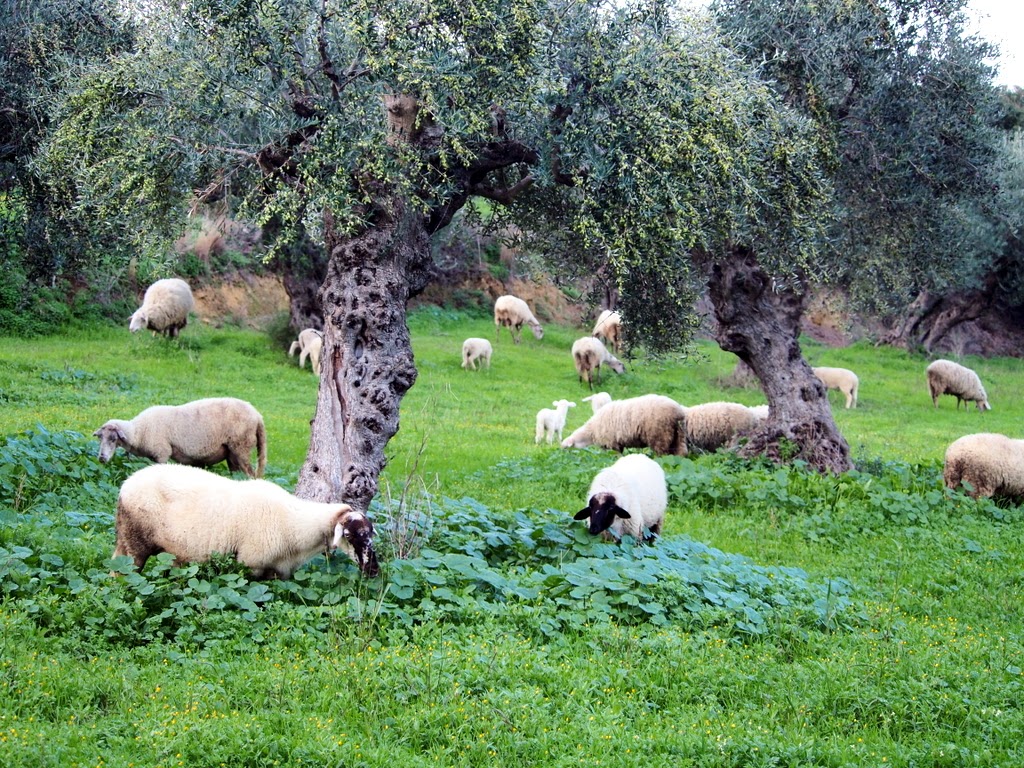I thought Italians were excitable but they seem positively
Germanic after a couple of days olive harvesting with the Greeks. We were
subcontracted out to help a local harvest his trees. He is a market gardener and certainly knows
how to produce a good olive crop. While most people are getting a fraction of
their normal crop this year he has a few spectacular trees. While we made do
with three and a half 70kg sacks of olives from this entire place (38 last year!), our first two
trees at Yorgo’s produced four sacks, that’s 140kg per tree for the mathematically
disinclined. Admittedly they were huge trees and difficult to pick – they were
well watered and probably well manured too. He has a plentiful supply of the latter from his
chickens and goats.
Harvesting Greek-style is “different". Like the Italians, it
starts with putting down the nets on either side of a tree. Then comes the arguments
about where the nets should really go: good, full-bodied shouting matches, and
this is just between the three generations of family members! After a couple of reshuffles someone hops
up the tree with a chainsaw running but without any sort of protective gear.
Various olive-laden branches come crashing down while everyone else whacks at
the remaining branches with a nervous eye looking upwards. They use sticks the size of walking sticks for the lower branches and long poles with a plastic
fork attached for the higher ones. Hitting the branches as hard as possible
seems to be the aim, olives fly in all directions. Often they land on the nets.
 |
| A local on the threshing machine ... |
One useful invention is the use of the threshing
machine. This strips all the olives off
a cut branch very quickly and feeds it into a sack – very efficient, though it
also propels olives everywhere else too. Of course there is no protective
equipment anywhere, we managed to use work gloves and wore hats which help ward
off the torrent of olives when someone is hitting a branch on the same tree or
using the thresher nearby. Safety goggles? We took some the second day once we realised the risk but they were not offered and no one else
bothered. Strange when olives are hard and eyeball sized…
The worst of the twigs and branches get raked off the nets
and then the olives get put into sacks. Carrying these sacks around isn’t pleasant
when they are getting full (70kg). We far prefer the Italian plastic bins for
this, they carry 20kg and are easy to carry and stack. But we’d hate to
break with tradition and be associated with [apparently] whimpy Italians. We're with the Italians on this one!
Lunch makes up for all the hard work. Almost everything
we had was produced on the farm, from all the vegetables, olive oil, olives, feta
(from the goats), and lashings of wine. Bread was the only item bought. After a
lot of eating, drinking and conversation (none of which we understood), we were
back to work. This was a repeat of the morning but with even more vocal arguments over
net placement (presumably due to the large intake of wine) and some unsteady
chain-sawing.
Much as it was interesting, neither of us would volunteer for
more picking in Greece. All the stick beating is hard on your body and, by not understanding the
language, the somewhat illogical way they work is frustrating. Given the arguments then
perhaps they get frustrated too. For
example, we saw a lot of olives missing landing on a net so we placed a spare
one next to it to catch them. Nope, not the right thing to do. One of the
family rushed in and dragged the net off to the side and left it in a heap so
the olives kept being lost. Oh well.
For our efforts Yorgo kindly dropped over a large water bottle of fresh olive oil, which we tasted with our Christmas lunch. Very green and peppery and, at this stage, still cloudy - it's wonderful!
For our efforts Yorgo kindly dropped over a large water bottle of fresh olive oil, which we tasted with our Christmas lunch. Very green and peppery and, at this stage, still cloudy - it's wonderful!



No comments:
Post a Comment